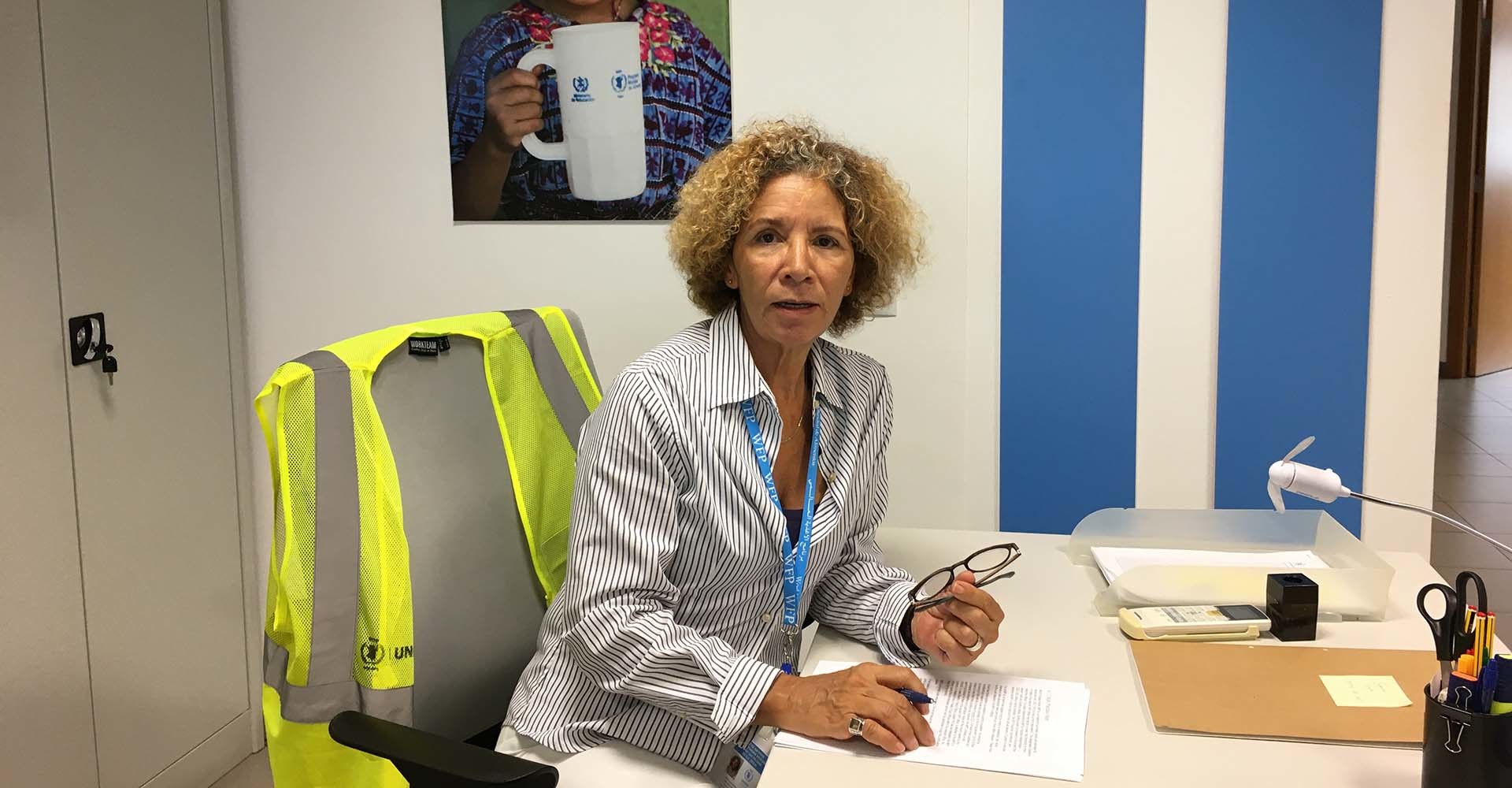Author | Tania Alonso Ivelina Nunes is the Director of the World Food Program (WFP) Las Palmas de Gran Canaria logistics base, one of the centers strategically distributed across the world by the UN to send food to communities affected by humanitarian emergencies.The aim of WFP for 2020 is to assist 138 million people, and the crisis caused by the COVID-19 pandemic has led to it having to intensify its efforts. We chatted with Ivelina Nunes to find out more about the challenges involved in managing the dispatch of humanitarian aid to places in crisis.
On any given day, WFP has 5,600 trucks, 20 ships and 92 planes on the move, delivering food and other assistance to those who need it the most. How many shipments set out from the Las Palmas logistics base?
Indeed, that is approximately the number of vehicles that WFP has on the move every day of the year. All 365 days, since humanitarian operations do not care whether it is a bank holiday or a Saturday or Sunday.Between January and June of this year, 55 ships, carrying a total of 10,000 tons of cargo, set off from the logistics base in Las Palmas. The yearly average stands at around 110 or 150 ships.
What is a normal day like at the base?
Our work involves anticipating the operational needs we have in the particular region, particularly in West Africa and the Sahel. To do so, we have an internal mechanism that allows us to purchase food in various markets at the most favorable time, i.e., when prices are lower.These products are mainly rice, pulses, oils and nutrient and vitamin-rich products, developed specifically by WFP for people suffering from malnutrition.
“Our system has enabled us to cut food delivery times from 138 days to 38”
As soon as any country or region is in need and submits an order, an entire supply chain is activated, which is where our warehouse comes into action, dispatching the load.This system enables products to be purchased when they are cheaper and for countries to acquire them before receiving contributions from donors (since the mechanism is based on contributions and funds received from all countries). Furthermore, it has enabled food delivery times to be cut from 138 days to 38 days. Very often it is even faster, even just one week.
How do you act during emergencies?
During emergencies, and at a local level, we have to organize and dispatch the order within a maximum period of 72 hours. The overall response involves various units and departments. For example, we depend on the availability of vessels.Sometimes the load has to be dispatched by air, which we do not normally do as it is very expensive; however, we are prepared to do so.
La base logística de #WFP 🏢en Las Palmas de Gran Canaria envía🚢productos nutritivos especializados a las poblaciones vulnerables afectadas por emergencias humanitarias🌡️💦No te pierdas este vídeo. Gracias a @AECID_es @MAECgob @LasPalmasPorts @GranCanariaCab#HambreCero pic.twitter.com/9ypOy7nFWp
— WFP Español (@WFP_es) September 24, 2019
Your base mainly serves West Africa and the Sahel and sometimes Central America and the Caribbean. What are the humanitarian requirements of the countries in these regions?
These countries are currently trying to maintain their own programs in operation. They are also adapting to the requirements of the population, which have increased with the pandemic.Confinement measures and other changes caused by this situation have led millions of people to lose their source of livelihood and their income has been drastically reduced.
“It will get to the point when many people will not know when they are going to eat again. It is extremely serious”
WFP estimates that the number of people facing acute hunger stands to rise by 80% this year. The 149 million people suffering hunger and with nutritional requirements, will rise to 270 million by the end of the year. Latin America and West Africa are the regions in which hunger is expected to increase the most as a result of this pandemic.West Africa could double the number of people facing serious food insecurity, while in Latin America it could even triple. Many people will not know when they are going to eat again. It is extremely serious.
What impact does this have on your ground operations?
WFP has had to change its planning in order to attend to the needs of many people. In 2020, we decided to increase the support and assist 138 million people, which is an increase of around 42% compared with 2019 (the annual average stands at around 97 million, which is what we were able to do thanks to contributions).We have also had to minimize the risks of transmitting the virus, staggering deliveries and setting up hand-washing stations. Our experience during the Ebola crisis in 2014 in West Africa and in 2019 in the Democratic Republic of the Congo have helped us adapt our actions on the ground and our programs.We have also started providing alternatives to school meals: there are children that depend on school meals to receive their daily food ration.
Are you able to reach 270 million people with the resources you have?
We depend on contributions. When we make plans to increase our coverage, we hope that countries’ contributions will also increase, from both governments and companies and individuals.There have been significant contributions, such as the 1.3 million euros provided by the Spanish Government for the crisis caused by the COVID-19 pandemic, in addition to previous contributions. We are grateful for them, but ideally we need to receive more.
In some countries, the COVID-19 pandemic has added to existing problems, such as terrorism in Boko Haram in Nigeria, or hunger in the Democratic Republic of the Congo.
The problem in these countries, such as Nigeria and the Democratic Republic of the Congo, is that they already had significant political or humanitarian conflicts before the pandemic arrived. This results in difficulties at various levels.The WFP differentiates between level-2 alerts, those that can be supported by regional agencies (including the situation at the Central African Republic, for example), and level-3 emergencies, which require global action. This was the case, for example, with the situation caused by the Tropical Cyclone Idai in Mozambique in 2019 or today in Yemen.
“The logistics base in Las Palmas also works as one of the six UNHRD centers in the world”
In the case of critical emergency cases, the work of numerous agencies is combined. The logistics base in Las Palmas also works as one of the six UNHRD centers (United Nations Humanitarian Response Depot) in the world. These centers send food, medical supplies, tools, survival kits and other emergency products. It also coordinates the work of experts responsible for the installation of survival camps or tents, with the aim of strengthening the on-site services for the humanitarian community and providing technical assistance.I like to say that WFP reaches places where others cannot reach. Where you see no Coca-Cola trucks is where we will be.
What advantages does technology offer to tackle these challenges?
Innovation has formed part of the DNA of WFP since it was created, in 1962, and technology greatly facilitates this innovation. Today, we have real-time information about the location of ships carrying our cargo, for example.An internally-developed application enabled us to implement improvements and save up to six million dollars in an operation in 2019 in Cameroon. It allowed us to upload data from all parts of the supply chain and identify more economical and efficient alternatives.We also use blockchain systems for cash-based transfers to families and drones for land recognition. This is particularly useful after natural disasters, such as in Mozambique after the cyclone. Which roads are passable? Which bridges have been destroyed? This information facilitates the work conducted on the ground. Another innovation is the 2019 award-winning SHERP. An all-terrain amphibious vehicle, with large tires, which we use during emergencies to get to flood or hard-to-reach areas.
Another innovation is the 2019 award-winning SHERP. An all-terrain amphibious vehicle, with large tires, which we use during emergencies to get to flood or hard-to-reach areas.
How are future challenges studied or predicted? For example, those caused by climate change, which may lead to more natural disasters or even new infectious diseases?
This is another innovation we have: we manage another internal application that provides us with real-time information of areas affected by disasters or which may be in the future. In terms of facing these challenges, it all translates into contributions. The more we have, the more people we will be able to support and the more we will be able to optimize our work.It is also important to understand that the crises we deal with are a global problem. If we do not fix the problems in these countries in need, they will have consequences for others in the long term. We need to work on helping these people to be able to stay in their homes and support themselves. Images | WFP/Desirée Rodríguez, Feliphe Schiarolli, Paola Aguilar





















































